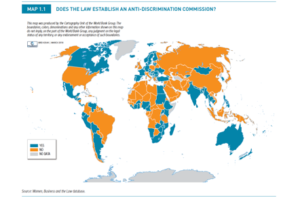According to the World Bank, women are barred from certain jobs in 104 countries.
Women continue to face widespread barriers, entrenched in laws, that keep them out of jobs and prevent them from owning businesses. Some countries are worse than others, yet no economy scores perfectly across all 7 criteria addressed in the report, revealing that there is room for improvement everywhere.
“Gender equality in labour law is associated with more women working and earning more relative to men,” says Sarah Iqbal of the World Bank. Yet some countries publish lists of jobs deemed too dangerous for women (Russia’s 456 include driving a train or steering a ship).
Others stop women from working in entire sectors, at night or in “morally inappropriate” jobs (in Kazakhstan women cannot bleed or stun cattle, pigs or small ruminants). In four countries women cannot register a business. In 18 a husband can stop his wife working.
The aim is often to protect the “weaker sex”. Some laws put women in the same category as children; they concern jobs seen as physically tough, such as mining, construction and manufacturing. Others relate to broader safety fears. In Mumbai, for example, female shopkeepers cannot work as late as male ones. Other laws are intended to protect a woman’s ability to bear children. “Such policies often have demographic motivations, especially in countries with low birth rates,” says Iqbal.
Restrictions on night work originated in England during the Industrial Revolution. They were based on the idea that women not only were weaker and more vulnerable to exploitation than men, but also lacked the competence to make valid choices.
Some laws are of surprisingly recent origin: Vietnam’s ban on women driving tractors of 50 horsepower or more came into force in 2013. But on balance, the trend is towards liberalisation. In recent years Bulgaria, Kiribati and Poland have removed all restrictions; Colombia and Congo have got rid of some. Other countries have changed laws in light of technological advances that have made many jobs safer and less reliant on brute force, or have seen courts overturn bans as discriminatory.
Labour shortages are also leading to change. Whenmale miners left Marmato, in Colombia, to find better pay elsewhere, female replacements were tolerated, even though hiring them broke the law. Similarly, when male truckers in eastern European countries that joined the European Union left for western ones, pressure to let women replace them increased. And the end of a ban on women working nights in the Philippines in 2011 was cheered on by the call-centre sector, which needed staff during daytime in America and Europe.
Some sex-specific restrictions are called for, says the International Labour Organization (ILO), particularly in the case of pregnant and breast-feeding women, for example when working with chemicals. (Such temporary and specific precautions are not counted in the World Bank’s study.) But ultimately, the ILO concludes that blanket protective prohibitions are “increasingly obsolete”.













